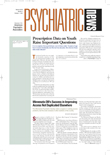When middle-aged men are depressed and antidepressants don’t help them, there may be another effective treatment for them—testosterone.
Indeed, this is what Harrison Pope Jr., M.D., chief of the Biological Psychiatry Lab at McLean Hospital in Belmont, Mass., and coworkers found in a small, preliminary study. They reported their results in the January American Journal of Psychiatry.
“These preliminary findings,” they wrote, “suggest that testosterone gel may produce antidepressant effects in the large and probably underrecognized population of depressed men with low testosterone levels.”
Past studies have shown that some depressed men have low blood levels of testosterone. Men with underdeveloped testes often show depressive symptoms, and testosterone replacement may improve these symptoms. This tantalizing evidence, combined with the fairly recent availability of testosterone supplementation via a transdermal gel, prompted Pope and his coworkers to undertake an exploratory study. They wanted to see whether a testosterone gel might counter depression in men who hadn’t gotten relief from antidepressants and who had testosterone levels on the low side for their age.
First Pope and his colleagues attempted to recruit, via radio ads and clinical referrals, potential subjects for their study. They were interested in men between 30 and 65 years of age who were experiencing a major depression and who were not receiving any relief from antidepressants. Fifty-six men expressed interest in participating in the investigation. Pope and his coworkers then tested each of the 56 men for morning blood levels of testosterone; 24 (43 percent) had borderline or low levels for their age (350 ng/dl or less).
Twenty-two of these men were then entered into the study, and they continued to take the same antidepressants that they had taken before. But in addition, 12 were randomized to receive 10 gms of a 1 percent testosterone gel daily for eight weeks, and the remaining 10 were randomized to receive a placebo gel daily for eight weeks. The researchers then tracked the subjects’ depression during the eight-week treatment period, using the Hamilton Depression Rating Scale, the Clinical Global Impression severity of illness scale, and the Beck Depression Inventory.
The subjects getting the testosterone gel improved, on average, significantly more than the subjects on a placebo, according to the Hamilton Depression Rating Scale. The improvement was evident on both the psychological aspects of depression, such as depressed mood, anxiety, or guilt, and on the somatic aspects of depression, such as sleep, appetite, and libido. The subjects getting the gel also showed, on average, a significantly greater rate of decrease in scores on the Clinical Global Impression severity of illness scale, but not on the Beck Depression Inventory.
Thus, it looks as if a testosterone gel might be able to help some depressed middle-aged men who receive no relief from antidepressants and who also have low levels of testosterone, Pope and his team concluded.
They also suspect that “low testosterone levels may be unexpectedly common in middle-aged men with treatment-resistant depressive disorder” since almost half of the 56 men who had been interested in participating in their study had borderline or low testosterone levels.
As far as negative side effects were concerned, one subject on testosterone reported difficulty urinating, suggesting that the testosterone was possibly exacerbating a case of benign prostatic hyperplasia. None of the other 11 subjects getting testosterone, however, reported any adverse effects. Thus, short-term treatment with testosterone gel appeared to produce minimally unfavorable effects.
This preliminary study, of course, did not answer some crucial questions, the researchers noted. For instance, what effect would testosterone supplementation over a longer period have on depression? Would it help depressed men not taking antidepressants, or would it be more useful as an adjunct to antidepressant treatment? Would giving testosterone over the long haul aggravate benign prostate hyperplasia or increase the risk of prostate cancer? And finally, how might testosterone counter depression? “It is too early to speculate,” Pope told Psychiatric News, “because it is a very idiosyncratic response in that some of our subjects responded dramatically, whereas others had absolutely no effect.”
Given the positive results from this preliminary study, however, and the potential public health benefits that might accrue from them, the value of testosterone as a depression treatment should definitely be explored, Pope and his team believe.
Am J Psychiatry 2003 160 105
